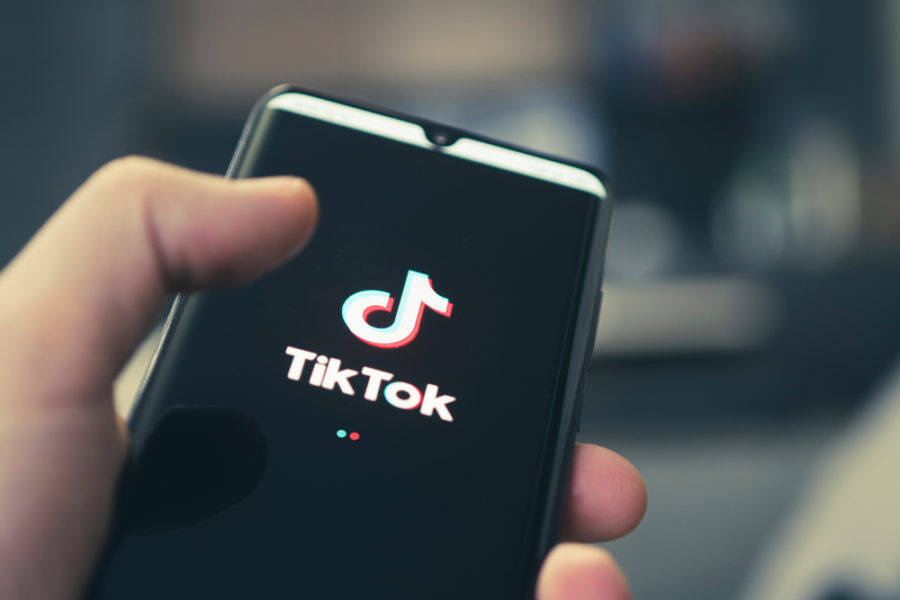TikTok is Taking Teen Thinking
Squirrel! Where was I? Oh right. Calculus.
More and more recently, I’ve noticed teachers becoming increasingly frustrated with student work. My classes have been reprimanded for their “glacial work pace” and snapped at to “pay attention”.
“Play subway surfers on the whiteboard!” A kid jeered.
Another chimed in, “Put on Mario Kart music!”
I couldn’t help but nod along with the class. External stimuli were necessary for me to devote even a sliver of my wandering mind to schoolwork. But our teachers didn’t seem to share the sentiment. To them, students are the problem—not the calm environment. In the past, classes could easily focus on the task at hand. In the past, they could sit in silence for hours taking tests. In the past, they didn’t need Snapchat or 2048 to make listening to lectures tolerable. So, what is wrong with our generation?
The obvious but scathing answer? The massively addicting social media app: TikTok.
Teenagers are quick to roll their eyes at this suggestion—can we stop blaming every problem on “those darn cell phones”? Millions of videos on TikTok itself characterize this annoyance with negative reactions to the recent congressional hearing involving TikTok Chief Executive Shou Zi Chew, insulting Congress speakers for extremely out of touch comments such as asking if TikTok uses the home Wi-Fi to function (that’s how the internet works, sweetie).
Outside of this generational gap in technology, perhaps there is some validity to their distrust in the social media app. Before you grab your pitchforks, consider sparing me a few minutes to explain—a difficult task, I know. Teenagers are trapped, scrolling for hours. Under-stimulated and overwhelmed, these children stick their head in the sand and let the real world fade. Reality replaced by the crippling need for instant gratification, we fall deeper and deeper down the rabbit hole. We’re presented with an all you can eat buffet; we’re all starving. But prolonged exposure to these surface skimming shorts isn’t without consequence. You can’t train your mind to think in quick sprints for hours at a time without expecting it to lose the ability to run marathons. Short attention spans have seeped from screen to reality, festering and infecting every classroom until students can no longer participate in the most important aspect of their teenage years: their education.
Of course, TikTok, an app with infinite videos designed for the individual user’s interests, is not in and of itself malicious. It has allowed cultures to connect across borders, and it has allowed smaller artists to receive the credit and fame they deserve, and it has given people a way to express themselves and feel less alone. The possibilities are endless. Never before have people been able to connect on such a large scale and find videos that exactly fit their niche interests. Common people can rise to fame or rally support for urgent global causes. Each of TikTok’s endless benefits make it extremely valuable—on its own.
Unfortunately, the same algorithm that allows this strong connection also lends itself to a format where these benefits are shoved and shaved into minute long boxes. Every video is a bombardment of different devastating issues or carefree comedies that demand rapid shifts in attention. The TikTok creators must compete for the most engaging first few seconds, or else the audience scrolls. This desperation for views has led to mindless micro trends that last only weeks at a time, and has led to flashy headlines with exaggerated violent disasters, and has led to an oversaturation of thoughtless content packed tightly back-to-back like a can of sardines. The possibilities are deafening. There is not enough time for deep understanding or comprehension—only surface level skimming. This is dangerous. Our mind’s ability to quickly shift focus is perfect for online surfing, but horrible for education’s deep-sea diving.
Students end up drowning. All they can do is try to keep their head above water—chattering during presentations, texting while teachers speak, legs bouncing throughout every test. It’s clear the current education system isn’t moving as fast as students’ fleeting attention. School’s classic lectures are regarded with either blank stares or distractions in the form of online games, online shopping, or social media. Assignments are turned in late, half done, or not at all. Students are fidgety, whispers are sidetracked, eyes zone out: these kids just cannot pay attention.
But why would they pay attention? Why would a seventeen-year-old determine the area under a curve when they could watch a day in the life of a traveler in Hawaii or the best places to visit in Tokyo? Why would they write an essay analyzing Scott Fitzgerald when they could watch the best sixty seconds of a South Park episode with Subway surfers playing at the bottom or street interviews rating strangers? Why jump into the deep end when you could happily sit back and dip your feet in the water? The satisfaction of completing a chemistry worksheet just doesn’t compare to the delicious, mind-numbing scrolling that lights up the pleasure center of the brain.
Like a slot machine, TikTok was built to be addictive. Every time a teenager opens TikTok, they’re gambling they’ll find something pleasurable—they always do. The hit of dopamine when a stimulating video pops up on their feed is nothing short of addicting. So, they keep scrolling, losing hours for the cheap thrill of finding a pleasurable video. We are drugging ourselves. Reality is depressing; online is bliss. Students, especially teenagers with their developing prefrontal cortex and decision making, have no incentive to put themselves through the pain of the real world.
With such a reliance on this instant gratification of TikTok, schoolwork slips into the background. We can watch ninety-minutes of infinite videos but when it comes to ninety-minutes of learning, our eyes droop shut. If students are unable to mentally attend class due to these short attention spans, then how can they truly learn? Education is critical for teenagers’ personal development. Educators are supposed to prepare students for the future, teaching them to solve real-world problems and complete complex tasks. But students are consistently falling short; their educations are failing them.
If students are not truly learning, then they lose the ability to fully understand concepts and process complex subjects. A lack of education creates an inability to participate in meaningful discourse and comprehension. Students will be unable to formulate original ideas and think critically and independently. If students scrape by and regurgitate surface-level information, what happens when there is a new disease without a vaccine or an unprecedented disaster? How will future generations solve issues they’ve never seen before if schools can’t teach them to think for themselves? Schools cannot help students prepare for the future when classroom are not engaging.
Teenagers need assistance to fight this digital addiction. Schools cannot keep throwing kids into the deep end and expect them to float. Curriculum needs to be reimagined. Repeated tedious lessons cannot penetrate through the brains trained for quick bursts of information. Students aren’t just lazy or slackers—they are paralyzed by the bleak future of the world and are turning to this addictive app to cope.
Students must also join in the effort to rewire their brains and reclaim their attention spans. The internet is all-consuming and never leaving, so we must do what we can to limit its detrimental effects on education and allow its positive benefits to add value to our lives. Subway surfers or Mario Kart can’t be a permanent solution. Our attention spans need, well, attention. It starts with shutting off TikTok every now and then. Your calculus homework is calling.
Go grab that squirrel.








